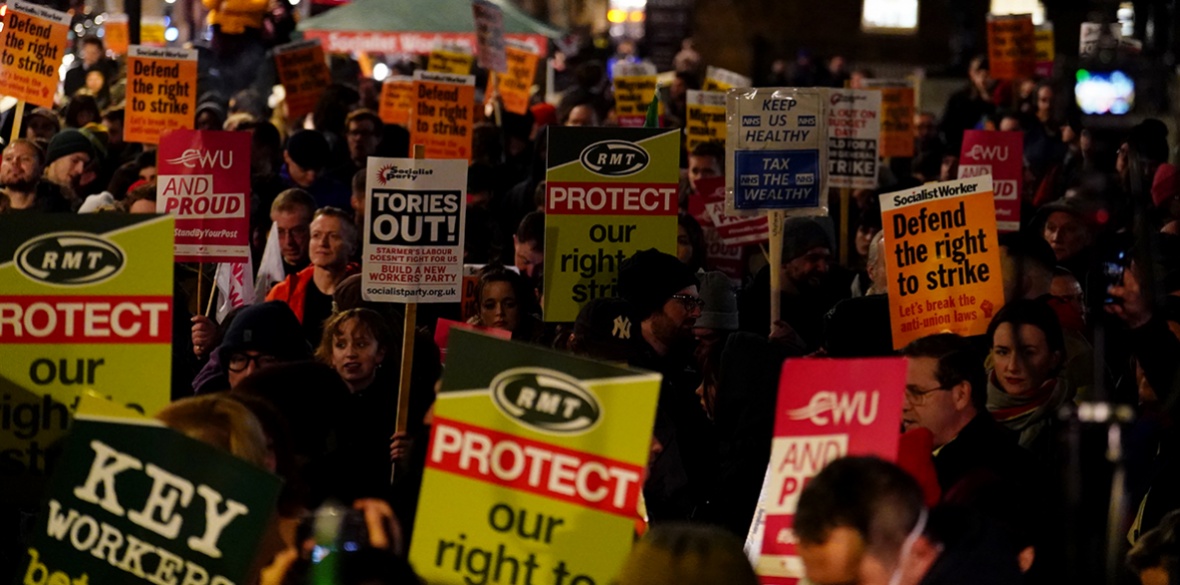This is the last article you can read this month
You can read more article this month
You can read more articles this month
Sorry your limit is up for this month
Reset on:
Please help support the Morning Star by subscribing here
THE Tories’ anti-strikes Bill was rammed through the House of Commons this week. MPs have had just a few hours to debate this key piece of legislation that delivers a blow to the right to strike.
The wretched piece of legislation will see workers who have democratically voted for strike action forced to go in to work. And it will see trade unions forced to play a role in policing them in to work. If they don’t, they will face legal action and heavy fines.
This Bill fundamentally alters the roles of trade unions and is a fundamental attack on one of our core democratic rights.
This is no one-off. It is part of an authoritarian drift by a government desperate to close off any challenges to its reactionary agenda.
The attack on the right to strike follows the restrictions on the right to protest through the disgraceful Public Order Bill. Amnesty has labelled that Bill “deeply draconian.”
And it follows attempts to prevent people from voting through the imposition of voter ID which will disenfranchise millions of people, especially from working-class communities and in particular ethnic minority working-class communities.
At its heart, this anti-strikes Bill is the Tories’ political response to the wave of strikes. The Tories are losing the argument with workers, as this week’s action shows, and with the wider public, so they have responded by curtailing one of the key ways that workers have to fight back.
Showing the weakness of its arguments, the government has had to mislead the public in making the case for its anti-strikes Bill.
The Prime Minister and Business Secretary have repeatedly falsely claimed that this legislation is about bringing Britain into line with Europe over so-called minimum service levels and have claimed that the International Labour Organisation supports such measures.
But ILO director-general Gilbert Houngbo said he was “very worried” about new laws that could see workers in Britain being sacked if they took industrial action.
While European Trade Union Confederation general secretary Esther Lynch warned that the British government’s plans would “push it even further away from normal, democratic practice across Europe.”
Far from the impression given by the government, the reality is that Britain already has some of the most restrictive trade union laws in Europe.
The annual Global Rights Index published by the International Trade Union Congress shows Britain continues to be a “regular violator” of workers’ rights and it lags significantly behind neighbouring countries on the rights of workers to organise through trade unions.
Every time we have had a Conservative government, from 1979 to 1997 and from 2010 onwards, they have introduced a series of restrictions on workers’ rights.
For example, the 2016 Trade Union Act made it even harder for unions to organise and restricted the right to strike further.
The impact of this has been clear, with unions at times overwhelmingly voting to strike but falling just short of the thresholds for ballots that don’t apply when electing politicians to Westminster.
The weaker rights for workers in Britain were underlined when P&O Ferries sacked 800 British employees and replaced them with agency-supplied workers at significantly lower rates of pay.
This series of attacks on trade unions and workers’ rights has been designed to prevent workers from getting their fair share of the wealth they create. It has been tremendously successful for the boss class.
In the era of neoliberalism, the share of the economy going in wages — that is, workers’ slice of the pie — has plummeted from 60 per cent to less than half today.
So hundreds of billions each year that would once have been going to workers now doesn’t. It’s a form of daylight robbery.
This situation is going from bad to worse. We are now in the longest squeeze on wages in 200 years. Without a boost to pay, real wages are not anticipated to return to their 2008 level until 2027. That’s two lost decades for workers, while profits soar.
Whatever Tory ministers say, pay rises are affordable. Research from Unite the Union found that profit margins for the UK’s biggest 350 listed companies were 73 per cent higher in 2021 than pre-pandemic levels in 2019. Soaring corporate profits could fund pay rises.
While the £12 billion needed for a public-sector pay rise in line with inflation could be paid for by ending the injustice where taxes on profits are paid at lower rates than the income tax workers pay on their wages.
For example, equalising capital gains tax rates with income tax rates alone would raise £17bn a year.
But this government won’t listen to arguments alone. The strike by half a million workers this week, in what will be the biggest day of industrial action in over a decade, is a key part of the fightback to reverse the trend where workers are left with less and less.
Every victory for the strikes is a step towards building a fairer economy and a more equal society.
And every victory against this reactionary anti-strikes Bill will defend our basic democratic freedoms against a Tory government that treats those rights with contempt.
Richard Burgon is Labour member of Parliament for Leeds East. He served as shadow secretary of state for justice and shadow lord chancellor from 2016 to 2020.









